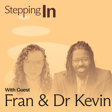Become a Creator today!Start creating today - Share your story with the world!
Start for free
00:00:00
00:00:01

Support in Grief
In this episode of Stepping In, Adam Klein speaks with the late Richard Levi, a facilitator of grief support groups who also coached individual clients through grief.
Grief can blindside and disorient the people directly affected—and those who wish to support them.
Richard offers ways to prepare ourselves to join our clients in the abruptly new world that grief often creates.
Here are some of the topics covered in the Stepping In
Transcript
Introduction to 'Stepping In' Podcast
00:00:07
Speaker
This is Adam Klein, global graduate, director, faculty member at New Ventures West. This is episode 15 of our podcast Stepping In, a podcast where we delve into how integral coaching can address some of the most pressing issues we face as individuals, as communities, and as stewards of our planet.
Introducing Grief Expert Richard Levy
00:00:25
Speaker
For this episode, I sat down with Richard Levy to speak about supporting clients experiencing grief.
00:00:31
Speaker
Richard is a New Ventures West graduate, ICF certified coach, and facilitator in the Bay Area and Silicon Valley. For the past 12 years, he has led groups with St. Joseph Hospices in Petaluma and Santa Rosa, facilitating grief support. Combined, these experiences make Richard a sought after expert at the intersection of coaching and grief.
Addressing Grief in Professional Environments
00:00:51
Speaker
In particular, assisting individuals, teams, and coaches to deal with grief in the workplace. Now, onto my conversation with Richard.
00:01:00
Speaker
So one of the questions I wrote down first, you know, maybe as a starting point is for you to say a little bit about how you understand grief and how you understand the process. And then maybe that can lead into how it shows up in coaching. Great. Yeah. How's that sound? Sure. That sounds fine.
00:01:23
Speaker
So the way grief shows up now in the world seems to be a little bit different than the way it used to show up. There's a period of time when it's really focused on the loss of a spouse or a parent or a child or a friend or a relative.
00:01:43
Speaker
And now it's starting to be realized that that plays also a very important part in the loss of a limb, in a mastectomy, in losing everything in a fire, having a life-threatening illness. So the grief experience is also something that people are going through that are actually experiencing a particular event in their life.
Understanding Modern Grief
00:02:05
Speaker
So they're living through that event and they become aware of the fact that they're also grieving through that event.
00:02:13
Speaker
So it's fascinating to work with different people because grief comes up in so many different ways. And I really have the privilege to be seeing people from someone, as I'm mentioning, who has a life-threatening illness to somebody else who had a loss 10 years ago and they feel like their grief is unresolved to somebody who had a suicide that happened a couple of weeks ago.
00:02:38
Speaker
All of the variations of how grief happens have been coming into my practice around grief, which has been really terrific.
Phases of the Grief Cycle
00:02:48
Speaker
And what I try to do is I try to identify where they are in the grief cycle. And what I mean by a grief cycle is that people have the event and then they usually go into some level of deep shock.
00:03:02
Speaker
So it's just the overwhelm of what happened, what the event was and what actually happened. After that, they step into a phase of deep grief. And in deep grief, which is a longer period of time, once the shock is over, then they really start to deal with the emotions that they're facing on a regular basis, day in and day out. And those are very intense emotions.
00:03:27
Speaker
and they vary and they go up and down all the time. So I may see somebody or somebody in grief will experience anger and 10 minutes later they're crying and the next moment they have very low self-esteem. They're really going through quite a roller coaster ride of what it feels like to experience the grief process.
00:03:48
Speaker
And my job as a coach is to make sure that I don't prohibit them from not stepping into every opportunity they can to experience the grief cycle. I want them to be there. I want them to live in those areas. I want them to feel all the emotions they have, because that's the quickest way to heal out of the grieving process. And once they've stepped into the deep grief, then they shift into what we call reorganization.
00:04:17
Speaker
So it's a time when they start to rebuild their lives. They look at finding a way to step back into a social climate that they may not have had since the person was gone. They look for new ways to identify things that they would like to participate in their life. So this particular cycle is a very clear barometer of what happens when somebody steps in grief.
00:04:40
Speaker
And what also is apparent is that people will go from shock to reorganization. They'll go from reorganization back into deep grief. There's no particular clear pattern that they go through. It can happen in any order they choose to go in. So we are
00:04:58
Speaker
we as coaches and are really need to be focusing on where the client is in the cycle and how we can support them through those times that they're facing.
Empathy and Listening in Grief Coaching
00:05:13
Speaker
And in one of the questions that was coming to my mind as I was listening to you talk is in witnessing all your work with clients, what have you,
00:05:25
Speaker
been impacted by in terms of people's capacity to step into these emotions? For me, it feels like I need to listen more deeply than I've listened necessarily before and more empathy than I've ever had before. And if I can arrive at that place with clients,
00:05:46
Speaker
It feels as if I'm allowing them and giving permission for them to step into any emotional place they want to go. So I'm holding this container and I'm allowing them to step in anywhere they choose. So for me, it's about making sure there's a great deal of space available.
00:06:06
Speaker
Normally, when a client comes in, it feels that they're shrouded in some heaviness, in some weight, and they're veiled underneath the pressure and the discomfort of grief.
00:06:19
Speaker
So what I look to do is to help them lift that off of themselves through expressing any emotion that's coming up for them that will help them step into a healing process and help them move them forward in a productive and successful way. Yeah. How do you do that? With patients and really being
00:06:50
Speaker
The way of being for me when I'm working with somebody in grief is just finding a way to be as completely present and in the moment as I can and unconditional. Now, those are not qualities I don't bring to my regular coaching clients, but they do feel heightened when you're working with somebody in grief.
00:07:13
Speaker
They want to know that they can be trusted because often people in grief have a social network of people that don't really understand how to support them. In our culture, in our country, grief is really not something that is easily discussed and talked about and looked at. So we don't really understand the full cycle of life from birth until death. Death seems to be something that people shy away from and not really want to approach.
00:07:39
Speaker
So my job is to let them know how natural and organic the process of grief is and to give them the place and the ability to step in and to experience anything they need to experience at that given moment. So I'm really calling upon any instincts that I have to make them feel as comfortable as I possibly can and to give them the permission to step in in any way they choose.
00:08:06
Speaker
So it's very different from working with an executive who I feel as if I'm approaching with a particular purpose and outcome and a desire to really want to create
Social Dynamics During Grief
00:08:16
Speaker
a plan for them and moving forward that achieves something around conflict management or authenticity or presence.
00:08:24
Speaker
It's a much more focused way of approaching coaching. With the grief work, it's a much slower process, but it is quite expansive in the areas that you may be stepping into with each individual. What I'm hearing is when that space is created, almost the natural process that takes over. How as a society and a culture,
00:08:54
Speaker
we're often moved to offer like some form of tangible support, which often can shut down that space. What I'm hearing is it can feel like intrusive maybe or
00:09:10
Speaker
Well, what seems to happen so often is that the people who are closest to you in an event like this happens may not be the right support system for you to be around as you're processing through this grief. So there's a lot of surprise by people who are in grief about not quite understanding why people who may be closest to them don't know how to be around this and they don't know the right things to say.
00:09:35
Speaker
They're curious to know why the particular person in grief isn't over it yet, or they haven't figured out a way to move forward in a more successful way. So the person in grief often feels judged by a selected group of their social network. So that really shifts when you're in grief, and the people who understand how to be present and available step forward, and the people who really don't know how to discuss it and be a part of it end up taking a backseat to the process and the experience.
00:10:05
Speaker
So you really become quite selective in wanting to choose the right people to surround yourself with who will really be there, uh, to, um, support you 100% and not judge you in any way. Yeah.
Integral Coaching and Grief
00:10:21
Speaker
Um, like your preparation for our call, you, you and I had talked about briefly the, one of the models that we use in integral coaching,
00:10:32
Speaker
which is called the six streams of competence and talks about, you know, as human beings, how we all have competence in, in our mind. So cognitive competence, emotional competence and somatic competence, relational, uh, spiritual and integrative. And actually what you were just talking about really surface this for me in terms of seems to me that sometimes grief is we're often focused on the emotional part.
00:11:02
Speaker
But what you're saying is also to pay attention to our relational competence and understanding what kind of relationships would help us if we're in the middle of grief, or if we're witnessing someone's grief, how to maybe reorient our relationship to them.
00:11:21
Speaker
Yes, absolutely. A little bit more about that part because sometimes I think this gets missed. Yeah. When I see somebody in grief, the six streams really are extremely different from somebody who is not in grief. Spirit to a place, very often people lose touch with their sense of connection to spirit because they feel as if, how could spirit have taken my home or taken my loved one or my child from me?
00:11:47
Speaker
So that becomes a big question mark about how the spirit is involved in this process. Relationally, as we're talking about, becomes very different because they need to select the right people to be around. The intellectual way that they think about themselves and approach any of their daily activities also shifts
00:12:09
Speaker
because their needs are different. Their wants and the way they think about their activities that they're taking care of during each day have a different sentiment and a different feeling to them. So both intellectually and emotionally there's a very big shift that happens.
00:12:28
Speaker
And what's somatically as well, I mean I often see clients who their posture is very very different than someone who is not in grief, their color, the way they stand, the way they speak. You can learn so much from observing somatically.
00:12:45
Speaker
where the client is about how to approach them and somatically is really actually a great opportunity to say would you mirror where I am so let's sit up straight together let's breathe together and experience something as one and that that's that's a very easy way for people to become in touch with what's happening for them in the grief process somatically.
00:13:06
Speaker
But streams really change dramatically during the grief process. And it's very tough to integrate things because they just feel so different. Everything is so outside of the
00:13:24
Speaker
sort of solar system that one creates when one is able to integrate things. So that feels like there's a richness when we integrate everything that happens because we can bring it together. And with somebody in grief, it feels like they fall apart. Yeah. And how have you seen this unfold for people who are in the middle of grief? You know, I'm imagining it's this sense of
00:13:52
Speaker
helplessness as well you know how do I make sense of my life now that this has happened and how do they find their feet again how do you support people in doing that and so that they can you know move with some agency in the world
00:14:09
Speaker
Yeah, when I work with clients in grief, my job feels to me like it is about opening the window a little bit wider so that more light can come into their lives. It feels like a very slow process and just as it goes on, there's more and more light that starts to return to that particular individual.
00:14:29
Speaker
So if you're looking back at the methodology of New Ventures, it does feel like most people agree for intermediate concerns. So we're really not looking to push too much on them. We're really looking for very small steps that they can make going forward so that they can really adapt and feel comfortable and feel the gravity of each of the things they're doing. And it's a slow build and a slow process.
00:14:57
Speaker
You know, the image that was coming to my mind, I think you used, you know, opening the window a little bit more for light is the process starting with like, let's, let's locate yourself in the room that you're in. Yes. Cause you may have dissociated from the room that you're in and you're looking everywhere else at all these other things and you've forgotten or lost a sense of like where you actually are in your life. And let's come back to that room.
00:15:24
Speaker
Yeah. Oh, and this room does have a window. Right. And there is fear about going back into that room because their experience is so different now because of the loss that that room doesn't look the same. So there is a job here to make sure that you're decorating the room again for them so that they start to feel comfortable with the walls that they're surrounded by.
00:15:53
Speaker
though there is a rebuilding in that as well because so much of their lives have so dramatically changed that any room they're in seems different than it was before. So it's a great distinction and metaphor to consider what we are doing as coaches as we are helping them to relive and redecorate the room that they're in so we can rebuild it to a place where they feel a level of comfort, ease and possibility.
00:16:23
Speaker
Yeah, it really touched me when you said that yes, they're in that room, but they're so different that the room doesn't feel the same anymore.
00:16:32
Speaker
Nothing feels the same with people in grief. It's an extraordinary thing to watch, in particular people that I've seen before grief and then after, is that it so changes everything about the perspective, the eyes we see, the what we smell, how we listen. All of our senses dramatically change just because we're in a world that's so different than the world we're in, days before the loss had happened.
00:17:02
Speaker
So it has a profound effect on every area in our life. And as a coach, I think it's essential that we all feel a level of comfort to be able to be with all of these emotions because we do experience and we are inviting them to express anything that they're feeling. And if we can't handle those emotions ourselves, we're probably not the right person to be working with somebody in green. Right. Right.
Guidance for New Coaches
00:17:31
Speaker
So on this, the threat of this, what would you say for, for people who are coaches who are new to working with grief or maybe even people in their lives who don't feel resourced in how to support people in grief? What would, what are some things that you would offer? Yeah. Um, let's see.
00:17:55
Speaker
The challenge when somebody is stepping in and working with grief who has never experienced grief, that can be somewhat problematic, I believe, because I think there needs to be a wealth of understanding that one has so that one can be with that person in any way that person shows up. So a new coach or somebody stepping into that may find it
00:18:21
Speaker
very uncomfortable quite quickly to be around that level of anguish and yearning and pain and sadness and Agitation and fury whatever the emotion is they're having so I don't I don't really know exactly how I can
00:18:39
Speaker
inspire a coach who hasn't had experiences around grief and don't understand or don't have the capacity to feel the emotions that one might be feeling. But I'm, you know, I, so I, I wish I had a better answer for you, Adam, but I don't think I did. Well, I think this is a great answer though, because, um, so, cause what I'm hearing in this answer is that sometimes there isn't a like, here's the thing that you can easily do.
00:19:07
Speaker
it might be more of this is maybe beyond what you're capable of at the moment and have someone to refer them to. Yeah, I think one of the things that is so essential in being a coach is that we understand what our capacities are and we also understand where our limitations might be. So the idea of having a referral and send out a client to somebody else makes perfect sense.
00:19:30
Speaker
And so many of the clients that I've worked with have actually come from other people referring them to me because I have this expertise around grief. But I think you're right, I think sometimes as coaches we feel as if we can handle everything and have the ability to step in in any way possible. And you know that just may not be true and the idea of actually
00:19:50
Speaker
or recommending someone else to work with that particular client may just be the exact thing that person needs, and they may easily come back to you after they go through the grief cycle. Yeah, yeah. I have this question and I'm trying to think of a way of asking it that isn't insensitive, but maybe there isn't one.
Transformational Power of Grief
00:20:10
Speaker
The way it's coming to me is like, what are some of the unintended gifts of grief?
00:20:17
Speaker
Well, it's, it's quite transformation.
00:20:25
Speaker
and it's enormously healing for individuals and they can see themselves so differently after they've processed through that particular cycle. So the transformation occurs just because they have fallen into the need to express anything that's inside of them and they may have never had that experience before. So they're becoming in touch with an emotional wealth that we all have
00:20:54
Speaker
that may have been dormant. So to go through and to feel as if we have this vast ability to choose multiple emotions that may be where we need to express at that particular moment is enormously healing and can be very transformational for people because they start to see themselves as a bigger and richer and more and fuller individual.
00:21:23
Speaker
that is expansive and has so many different ideas, concepts, and experiences they can call upon just because they have gone through the Greek cycle. I see this all the time where it can be a very transformational experience for people to go through Greece.
00:21:44
Speaker
once they go through the whole cycle and they move past it. And that can happen in a year or six months, two years, 10 years. There's no way to judge how long grief occurs. It's as long as it takes. There's no way to shorten that process. And if we try to shorten that process, we're shortchanging ourselves by not going through each of the steps required to heal. So it just takes as long as it takes.
00:22:15
Speaker
but yet this wonderful way in which, you know, maybe we didn't for whatever reason step into it three years ago, but it's still possible to do it. Like it's never late.
00:22:26
Speaker
Yeah, there's just no timetable to this all. I work with somebody right now who has a life-threatening illness and a very intense level of cancer and a very bad diagnosis right now.
Life Reevaluation Due to Illness
00:22:46
Speaker
And what it's done for this particular individual, it has really forced him to step back in and ask himself what the core values and his deepest desires are, because he has an opportunity right now to live for whatever period of time, six months a year, two years, but he can really transform his life and do whatever he chooses to do.
00:23:13
Speaker
And it's sort of been miraculous to watch this unfold because he has created a bond with his wife and his 13-year-old child and really embraced these final weeks, months, or years that he has to make sure that he is living every day to the fullest.
00:23:34
Speaker
So that is also something that comes up quite a bit, in particular with people who are dealing with life-threatening illnesses that are advanced, you know, heavily advanced in their lives. It really forces them to change who they are at that particular moment, reevaluate how they want to step forward in their lives, and make decisions that are really about making sure that every day is rich and important and as vital as it possibly can be.
00:24:04
Speaker
Yeah, a real opportunity for us to all wake up. Right, yeah.
00:24:12
Speaker
Yeah, and it's really incredible how that happens. The process of, it feels like a rebirth in some ways, is really to pull somebody out of that well of despair and concern and unhappiness and allow them to potentially reinvent themselves so that they can go through this process with a different sense of ownership and understanding and clarity is really amazing to see happen.
00:24:40
Speaker
It can transform people so that they know that however they step forward at this particular moment is in their control and in their decision. And one often feels when one has something life-threatening is that it's completely out of their control because there's nothing they can do because of what's happened to them.
00:25:00
Speaker
Quite the contrary, this is actually a moment in their lives where they can seed and give birth to something that's incredibly important for the way they step into whatever time they have left.
Podcast Conclusion and Listener Engagement
00:25:16
Speaker
I'm Adam Klein. Thanks for joining us. Please spread the news by sharing this podcast in social media and let us know what you think by emailing us at steppinginatnewventureswest.com. Until next time, take care.
00:25:30
Speaker
Thank you.










